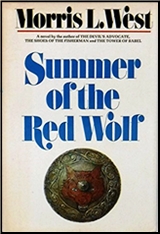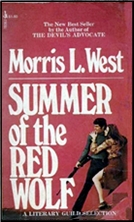Sat 26 Feb 2022
Reviewed by David Vineyard: MORRIS WEST – Summer of the Red Wolf.
Posted by Steve under Reviews[3] Comments
MORRIS WEST – Summer of the Red Wolf. Morrow, hardcover, 1971. Pocket, paperback, 1972.

The unnamed narrator of Summer of the Red Wolf is a writer facing the most extreme kind of ennui. He is fed up with civilization, sick of the world; “I was engulfed in black despair.â€
Maybe it is fate he meets Alistair Morrison. Morrison is one of those fictional deus ex machina the hero of this kind of book encounters at just the right moment, a semi-mystical philosopher/gadfly who plunges our narrator into a life devoid of all the pretense of civilization.
“What road?â€
“To the place of unknowing.â€
For our hero the “place of unknowing†is beyond the isle of Skye, “and may Saint Donan be between you and harm.â€
On the way to his remote fate our hero meets Dr. Kathleen McNeil, a dark haired long legged Scot he will soon fall in love with, and the man who will change his life, Red Ruarri Matheson, master of the ship Mactire (Celtic for wolf), a bearded Viking of a man, “…he had the watchful sidelong glance of the commando,†a dangerous man, a gun runner, and more, friend, enemy, antagonist, and killer. Ruarri the Mactire.

The writer, who Rurarri calls sennachie, or storyteller, sees himself in the shadow of the Red Wolf, but unconsciously matches him as an adventurer. This is the classic form of the adventure novel, David Balfour meeting Alan Breck, Jim Hawkins first encountering Long John Silver, the narrator of The Third Man meeting Harry Lime, Marlow and Kurtz, the opposites that not only attract, but that are strangely mirror images…
Morris L. West cut his teeth writing adventure fiction and thrillers in his native Australia before he turned to bestseller-dom with books like The Daughters of Silence, The Ambassador, and eventually The Shoes of the Fisherman, Harlequin, The Navigator, and The Salamander. Eventually Hollywood came calling too with movies and mini-series and his works topped the New York Times Bestseller List regularly.
Eventually Red Ruarri, wild Ruarri, Ruarri the Red Wolf goes too far and the sennachie has to challenge him, a demonstration of fencing with a saber with Ruarri out to do real harm, and the narrator recognizing he can only save himself and Ruarri by besting him.
There is murder at the heart of the story, and a surprising twist in the dynamic between the man of letters and the man of action that comes at the books emotional climax.
This is Buchan and Stevenson country with hints of Conrad’s complexity and depth, a kind of poetry of adventure and far places on the edge of civilization as most of us know it. It is the poetry of the wild wet wind off the sea, of rocky coasts, and ice driven breezes, of life lived at a different pace closer perhaps to the both the elements and the ever present shadow of death. West was the most literary of the major bestselling writers of his time and something more than just a name on the bestseller list, and this, I suspect, his most personal novel.
If it is not great literature it is a kind of literary experience that I have always savored, and will, I hope continue to for as long as I read and write. Those “places of unknowing†call the armchair adventurer in all of us, and to be fair it is a damn site more comfortable than the actual icy blast of the North Sea and the wind rattling the shutters as the wild thunder rolls and heavy waves erode the shore.
Summer of the Red Wolf is as good a choice to curl up in a good chair with a snoring cat in your lap or dog beside you, a glass of good whiskey at hand. and settle in for a long read as I can imagine, and for me that in itself may be my highest recommendation. The Sennachie and Ruarri the Mactire will linger in your imagination long after you have turned the last page and laid the book aside.
February 26th, 2022 at 8:17 pm
Your review makes this sound like an adventure novel, but one with enough criminous content to be in Hubin. I just checked. It is!
February 26th, 2022 at 10:31 pm
West started out writing adventure somewhere between Hammond Innes and Victor Canning in style so many of his early books have criminous elements.
DAUGHTERS OF SILENCE and THE AMBASSADOR drew him attention from the critics as a mainstream writer and SHOES OF THE FISHERMAN sent him to the top of the bestseller list.
Later books like TOWER OF BABEL (suggested by the role of Israeli spy Ben Cohen and the Six Day War), SALAMANDER (about a latter-day fascist attempt to overthrow the Italian government — made into a mini series with Anthony Quinn and Franco Nero) and HARLEQUIN *also a mini series) had criminous and international intrigue overtones.
In his later career he bounced between these and his Vatican series that began with SHOES OF THE FISHERMAN.
His THE NAVIGATOR deals with a Thor Heyderahl style anthropologist risking his life and others to prove a controversial theory.
Gun-smuggling and murder both feature in this one, that owes a bit to John Buchan’s JOHN MCNAB for its central idea of modern men sick of civilization finding the cure in some inventive criminality.
February 28th, 2022 at 1:41 am
West was certainly an oddball.
What do I admire him for most? Not his storytelling, which was always thoroughly competent and capable.
I appreciated him most when he went beyond what mere narrative called for; when he expressed his abiding interest in mystic subjects and esoteric morality.
These matters seemed to ignite his passion, and he conveyed his absorption to his audience via his texts.
West seemed to carve out his own unique turf in these realms. Book after book. Similar to Andrew H. Greeley.
A strange and difficult author.